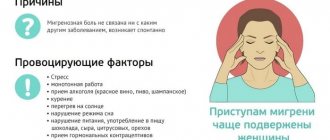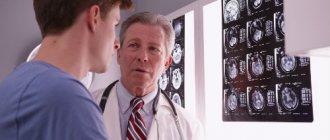Nausea is a painful sensation of discomfort in the upper abdomen, esophagus and mouth; anticipation of vomiting. When describing such symptoms, patients say “I feel sick.” Sometimes the symptoms of nausea are less pronounced, in such cases they say “nauseous.” Nausea is often accompanied by weakness, sweating, and increased salivation. A person experiencing nausea may experience a decrease in blood pressure, become pale, and feel cold in the extremities.
Nausea - why? Possible causes of nausea
Diseases in which nausea is observed may relate to pathologies of the digestive, nervous, endocrine, cardiovascular and reproductive systems. Most often, nausea is a symptom of diseases of the gastrointestinal tract - both chronic (for example, gastritis, peptic ulcer, duodenitis, enterocolitis, cholelithiasis, pancreatitis, hepatitis, etc.) and acute (peritonitis, appendicitis, acute pancreatitis, acute cholecystitis and etc.) requiring immediate medical intervention.
Nausea can also be caused by reasons such as:
- pregnancy (morning sickness is often observed during the first trimester. It is caused by hormonal changes occurring in the body of the expectant mother);
- side effects of medications;
- toxic substances (poisoning);
- psychogenic causes (anxiety, severe fear, hysteria);
- overheating (hyperthermia), sunstroke.
Why don't we feel rested after a short nap?
Very often it seems that a long afternoon nap will relieve fatigue and add strength and vigor. And when you finally get the long-awaited chance to take a nap on Sunday, after this siesta you feel as tired as before. Why is this happening? Science will explain everything According to the director of the Sleep To Live Institute, Robert Oxman, the causes of drowsiness are 2 main factors: the homeostatic factor of sleep and circadian rhythms. The homeostatic component is this: the longer you stay awake, the more chemicals accumulate in your brain. They ultimately “tell” you that it’s time to go to bed. The circadian rhythm is your internal biological clock. According to this clock, the body is awake at a certain time of the day (usually in the morning) and feels the desire to sleep (in the evening). When there is a violation of any of these 2 factors, the person feels drowsy. Scientists have also found that the duration of your nap directly affects how you feel when you wake up. According to NASA research, naps should last between 10 and 26 minutes to improve mental performance. Research also showed that a 26-minute nap improved alertness by 54%. If you sleep for more than 30 minutes during the day, you will smoothly move into the REM phase (rapid eye movement phase). Then you are likely to sleep for 90 minutes, which is a complete sleep cycle. Unfortunately, such a rest can disrupt cycadal rhythms and simply disrupt the usual daily routine, causing more harm than good.
Daytime sleep affects the quality of night sleep If lately you have been constantly feeling tired and distracted, whereas you are usually active and attentive, then with a high probability we can say that the reason lies in the quality of your sleep. To improve your overall health, you need to analyze how you sleep at night and during the day. Just ask yourself a few questions - this will help you determine what exactly negatively affects the quality of your sleep and rest.
- Do you often wake up after going to bed?
- Do you use your phone or laptop until the very moment you go to bed?
- Do you experience physical discomfort in the morning?
These are factors that may be causing your chronic fatigue, and it is important to identify any changes to improve your sleep quality. If you make up for the lack of sleep at night with daytime siestas, this could be the cause of your daytime fatigue. If you are worried that you will not be able to fully get the necessary hours of night rest, then it is better to contact a specialized store of goods for healthy sleep. Competent specialists will help you choose a sleeping place individually for you, which will allow you to get a good night's sleep and not fall asleep during the day.
Nausea and frequent headaches
Nausea is often complained of simultaneously with recurring headaches. Such symptoms may indicate diseases of the nervous system. This could be: migraine, traumatic brain injury, meningitis, borreliosis. Also, nausea and headaches can be combined with diabetes and arterial hypertension.
Sleep disturbance
Arthritis
Rheumatism
43714 06 November
IMPORTANT!
The information in this section cannot be used for self-diagnosis and self-treatment.
In case of pain or other exacerbation of the disease, diagnostic tests should be prescribed only by the attending physician. To make a diagnosis and properly prescribe treatment, you should contact your doctor. Sleep disturbance: causes of occurrence, what diseases it occurs with, diagnosis and treatment methods.
Definition
Sleep disturbance, or insomnia (insomnia), is a general term that includes difficulty falling asleep, problems staying asleep, and waking up too early. As a result, during sleep a person cannot fully restore strength and performance, which reduces the quality of life. Sleep disturbance to one degree or another is observed in almost half of the adult population, but only in 9–15% of people does this problem become clinically significant. In older people, chronic insomnia is observed much more often than in young people - more than 55% of cases.
With any sleep disturbances, a person experiences fatigue, decreased attention or memory, depression, depression, and decreased vital activity.
Types of sleep disorders
Depending on the cause of sleep disorders, primary and secondary insomnia are distinguished. When diagnosing primary insomnia, organic, psychiatric, or neurological causes for sleep disturbance are not noted. Secondary insomnia is the result of various diseases, taking stimulants, or any unfavorable external conditions.
Sleep disturbances can be acute (transient), short-term (up to 6 months) and chronic (more than six months). Acute sleep disturbance can occur in any person under the influence of stress, overexcitation, or due to time zone change. Chronic insomnia develops in people predisposed to it. Typically, this condition affects elderly patients, women, people who, for one reason or another, sleep no more than 5 hours a day, as well as those who experience prolonged absence from work, marital divorce, psychological and psychiatric trauma, and patients with chronic diseases.
Possible causes of sleep disorders
Difficulty falling asleep is the most common complaint of patients. The desire to sleep that a person experiences before going to bed, but it disappears under the influence of a variety of factors when the person lies down. These may be unpleasant thoughts and memories, the inability to find a comfortable position due to restlessness in the legs, pain or itching, or extraneous sounds. A light drowsiness is disturbed even by the slightest noise, and sometimes a person who has fallen asleep thinks that “he hasn’t slept for a minute.”
There can be many reasons for such difficulty falling asleep, in particular, lack of fatigue, spending a long time in bed during the day, irregular bedtime, anxiety, illnesses that cause itching or pain.
A common complaint is unpleasant sensations in the lower extremities (pins and needles, trembling, tingling, burning, twitching), which force you to constantly change the position of your legs (restless legs syndrome). Symptoms are significantly weakened or disappear completely with movement. The best effect is often achieved by walking or simply standing. Recently, the proportion of patients who have problems falling asleep due to the consumption of stimulating drinks (tea, coffee, energy drinks) in the evening, as well as the abuse of medications (caffeine, psychostimulants, some antidepressants, antipsychotics, nootropics) has increased.
Problems with maintaining sleep mainly consist of frequent awakenings, after which it is difficult to fall back to sleep, and a feeling of “shallow” sleep. The reasons for awakening can be very different (dreams, fears, nightmares, breathing problems, palpitations, the urge to urinate).
Most often, chronic insomnia is a symptom of neurological and mental diseases.
Complaints of poor sleep are typical for patients with stroke, dementia, Parkinson's disease, and Alzheimer's disease. Mental illnesses such as depression, schizophrenia, and anxiety-manic states are also accompanied by sleep disturbances.
In many cases, frequent awakenings at night are associated with sleep apnea.
This respiratory disorder occurs during snoring due to the collapse of the tissues of the pharyngeal ring during inspiration and is characterized by a short-term cessation of breathing, which is accompanied by a decrease in blood oxygen levels and interruption of sleep.
Disruption of the circadian rhythm almost always leads to chronic insomnia. This situation occurs during shift work and shift work, as well as among those who sit for a long time in the evening watching TV or a computer. Excess blue light from screens in the evening and night hours causes desynchronosis - a disruption of the circadian biorhythm, which, in turn, leads to sleep disturbances.
Frequent awakenings can be a consequence of cardiovascular (arrhythmias, arterial hypertension), pulmonary (COPD), musculoskeletal (arthritis, rheumatism), genitourinary (prostatitis, urinary incontinence) and endocrine diseases.
Problems with early morning awakening are observed in older people, people suffering from depressive disorders, and panic attacks. As a rule, sleep is interrupted at 4–5 o'clock in the morning and does not resume. Immediately after waking up, patients note a flood of negative thoughts rushing over them. In the morning and during the day they complain of a “broken” state, they have decreased performance, and constant drowsiness.
Which doctors should I contact for sleep disorders?
Initially, you should consult a general practitioner to determine the true cause of insomnia and identify possible concomitant diseases that may lead to sleep disturbances.
If you suspect depressive syndrome, you should consult a psychotherapist or neurologist. With successful treatment of neuropsychiatric disorders, sleep usually returns to normal.
In cases where diagnosing sleep disorders is difficult, the therapist refers the patient to a somnologist.
Diagnosis and examinations for sleep disorders
When diagnosing sleep disorders, the first step is to understand whether insomnia is primary or secondary. It should be borne in mind that about 80% of cases of sleep disorders are caused by various diseases. Along with complaints of poor sleep, the following factors should be taken into account: snoring, excess weight, arterial hypertension, neurological disorders (stroke, traumatic brain injury), the presence of diseases that can cause pain at night (rheumatism, myalgia, arthritis of various etiologies) or itching (psoriasis, herpes, thyroid and liver diseases).
Nausea at night
Another common complaint is nausea at night . A sleeping person remains in the same position for a long time; the normal functioning of the body's systems is weakened. This leads to the fact that the feeling of discomfort accumulates, and, in the presence of pathological reasons, when you wake up, you can feel a strong attack of nausea.
Such attacks of nausea (in the morning or at night) can occur during pregnancy and be a consequence of toxicosis. Another cause may be hypothyroidism, a disease of the thyroid gland. Cardiovascular diseases (arterial hypertension, vegetative-vascular dystonia) can also cause nausea in the morning or at night. A common cause is diseases of the gastrointestinal tract (primarily gastritis and cholecystitis). In this case, nausea is usually accompanied by heartburn, pain and burning in the abdomen.
What to do if you feel sick in the morning
It is important to understand that regular morning sickness is a signal of the presence of a pathology or disease and self-medication is highly undesirable. Be sure to consult a doctor for an examination, but if you do not have such an opportunity at the moment, there are several effective ways that will help reduce or temporarily get rid of this problem:
- Medicines. You need to be very careful and you must be sure that morning sickness is not the cause of pregnancy or an intestinal disease.
- Drinks made from ginger root, mint and lemon. You can make infusions of these products for maximum effect by simply adding them to a glass and pouring boiling water, after 15 minutes you will have a very effective and safe (in the absence of allergies) remedy for morning sickness. YOU can also just add them to hot tea.
- Medicinal collection - if nausea persists in the morning, you can try a collection of mint, oak bark and celandine. To prepare the drink, take 1 teaspoon of mint leaves, dried oak bark and crushed celandine, pour 0.5 liters of boiling water and boil in a water bath for 10 minutes. After the broth is cooled and filtered, take 1 tbsp 3-5 times a day before meals.
- During pregnancy. There are little tricks you can use. For example, do not get out of bed quickly, drink plenty of fluids. Eliminate fatty and heavy foods from your diet. Eat small meals several times a day.
Does paracetamol help with headaches?
Paracetamol is an affordable and time-tested medicine for various types of pain. The drug alleviates the physical condition and has almost no side effects. The medicine helps adults and children, but requires careful dosage when used.
Paracetamol mainly acts as a pain reliever. The phenacetin derivative inhibits the production in the body of compounds responsible for sensitivity to pain - prostaglandins. At the same time, it affects the thermoregulation centers, reducing high body temperature.
Paracetamol is good for relieving headaches in acute respiratory infections. In other cases, it is worth using another analgesic or seeking medical help. In some cases, paracetamol will only dull the pain, but not solve the problem completely.
Why does my head hurt in the forehead area?
This phenomenon is quite common in all age groups of the population. Such pain can be acute or chronic, occur independently or in combination with other symptoms. Pain in the frontal lobe occurs even in a healthy person, so their one-time occurrence should not be a cause for concern.
If a person constantly has a headache in the frontal lobes, then there are a number of reasons for this:
- Tension headaches can occur even in healthy people. We must remember that rest is an integral part of the life process. This pain may go away after taking analgesics.
- Eye pain may also spread to the forehead area. The pain begins behind the eyes and spreads to the frontal lobe. Its manifestations are similar to tension headaches: they occur against the background of overwork or active mental work, last from several hours to several days, and are easily relieved with over-the-counter analgesics.
- Sinusitis causes sharp pain in the frontal part of the head and nose. Accompanied by impaired nasal breathing, lacrimation and decreased sense of smell.
- Arteritis is considered the rarest cause of headaches. The disease is associated with inflammation of the walls of large arteries. They become dense and visible above the surface of the skin. The main symptom of the disease is acute pain in the forehead.









